Overview
- Introduction: When Do Puppies Stop Teething
- Puppy Teething Timeline
- The Teething Stage
- Common Behavioral Changes
- Recognizing Teething Complications
- Managing Teething Discomfort
- Dental Care for Puppies
- Nutritional Considerations: Supporting Your Puppy's Teething Journey
- Teething in Different Breeds
- Environmental Factors
- Teething and Training
- Socialization During Teething
- Teething and Sleep Patterns
- Monitoring Dental Health
- FAQs on Puppy Teething
- Summary
- Conclusion
Introduction: When Do Puppies Stop Teething

Welcoming a new puppy into your home is an exciting journey, and part of this adventure includes navigating the unique phase of puppy teething.
Much like witnessing a tiny furball transform into a canine with a full set of teeth, understanding this natural process is crucial for every dog owner.
In this comprehensive guide, we'll delve into the intricacies of puppy teething, exploring the signs, stages, and effective management strategies.
Definition of Puppy Teething
Teething, a natural and necessary process, marks the transition from baby teeth to puppy's adult teeth. This developmental stage typically commences around three weeks of age and persists until they reach approximately six months old.
Importance of Understanding the Teething Puppy Process
Similar to human babies, puppies undergo discomfort during teething. A keen awareness of this process empowers you to support your furry friend through this challenging time, ensuring a smoother transition into adulthood.
We'll explore the puppy teething timeline, symptoms, and ways to relieve teething pain, shedding light on this sometimes painful but essential stage in your puppy's life.
Puppy Teething Timeline
Navigating your puppy's teething journey involves recognizing the early signs and understanding the age-related milestones of this natural process.
Early Signs of Puppy Teething
How can you tell if your pup is teething? Keep an eye out for telltale signs such as excessive drooling, a tendency to gnaw on various objects, and a slight decrease in appetite. These indicators typically manifest around three weeks, marking the initiation of the teething phase.
Age Milestones for Teething Puppy Phases
Understanding the age-related milestones of teething is crucial for anticipating and meeting your puppy's needs. The initial teething phase commences at around three weeks, and most puppies have fully developed adult teeth by the age of six months.
Recognizing these timelines enables proactive care, addressing sore gums and other puppy teething symptoms as your furry friend progresses through this essential developmental stage.
As your puppy's baby teeth start to fall, making way for permanent teeth, you'll witness this transformative process unfold, providing insights into the natural evolution of your puppy's dental development.

The Teething Stage
Navigating the stages of your puppy's teething process involves understanding the eruption, shedding, and growth of their teeth.
Puppy Teeth Eruption
Puppy teeth follow a specific order of eruption, beginning with incisors, followed by canine teeth, and culminating in premolars. This organized sequence ensures a seamless transition from baby teeth to adult teeth, supporting your pup's teeth healthy dental development.
Shedding of Puppy Teeth and Permanent Teeth Begin
Around the four-month mark, your pup initiates the shedding of baby teeth, creating space for the emergence of the adult set. While finding tiny teeth around your home is a normal part of this growth phase, it signifies the progression towards a mature dental structure.
Growth of Dog's Adult Teeth
By the age of six months, your puppy should exhibit a complete set of adult teeth. Consistent checks during this critical period are vital for monitoring proper development and promptly identifying any potential issues.
This proactive approach ensures that your furry friend cultivates healthy chewing habits, laying the foundation for a lifetime of optimal oral health.
As your puppy's deciduous teeth or milk teeth naturally fall out, making way for the emergence of adult teeth, this transformative period significantly contributes to the overall well-being of your puppy's mouth.
Keeping a close watch on this process allows you to foster a positive environment for your puppy's dental journey, supporting the natural emergence of their permanent adult teeth and promoting lasting teeth health.

Common Behavioral Changes
Chewing Behavior
Teething puppies exhibit a heightened desire to chew as an instinct to alleviate discomfort. To safeguard your belongings from becoming unintended teething targets, provide your pup with appropriate chew toys.
This not only satisfies their chewing inclination but also promotes the healthy development of their teeth.
Puppy's Teething Pain: Irritability and Discomfort
Teething can render your puppy a bit irritable. During this phase, exercising patience and understanding is crucial for maintaining both your sanity and your puppy's overall well-being. Recognizing and accommodating their temporary discomfort allows for a smoother transition through this natural developmental stage.
Coping Mechanisms for Puppies
As your puppy navigates the discomfort of teething, introduce various coping mechanisms to ease their experience. Consider frozen chew toys or soothing gels designed specifically for teething puppies. Experimenting with different options helps identify what works best for your furry companion, ensuring they find comfort and relief throughout their teething journey.
By understanding the common behavioral changes associated with teething, you can actively contribute to your puppy's well-being, making this phase more manageable for both of you.

Recognizing Teething Complications
Signs of Teething Problems
While teething is a natural process, it's essential to be vigilant for signs of complications. Keep a close eye on your puppy for indicators like bleeding gums, persistent pain, or a sudden refusal to eat. These signs could signal teething issues that require prompt attention.
Monitoring your puppy's behavior and physical condition allows for early identification of potential problems, ensuring proactive care.
When to Consult a Veterinarian
If you're uncertain about any teething-related concerns, don't hesitate to seek guidance from your veterinarian. Early intervention is key in addressing teething complications and preventing potential long-term issues.
Your veterinarian can provide valuable insights and recommend appropriate measures to ensure your puppy's dental health is prioritized.
By staying attentive and seeking professional advice when needed, you contribute to your puppy's overall well-being and maintain their oral health, making their teething journey as smooth as possible.

Managing Teething Discomfort
Types of Chew Toys for Teething Puppies
Recognizing that not all chew toys are created equal is crucial when addressing teething discomfort in puppies. Opt for puppy safe chew toys specifically designed for teething puppies to ensure they are safe, durable, and effective in providing relief.
Suitable Puppy Teething Toys
Choose safe chew toys with various textures that serve a dual purpose—massaging your puppy's gums and satisfying their instinct to chew. This approach promotes not only dental health but also provides entertainment, making it a win-win solution for both you and your furry friend.
Chew Toy and Cooling Solutions
Utilize the power of cold to soothe teething pain. Consider freezing a wet washcloth or providing frozen treats for your pup to chew on. The cooling effect helps numb their gums, offering relief during this challenging phase.
Teething Gels and Medications
Before considering teething gels or medications, consult your veterinarian for guidance. They can provide valuable insights into safe and effective options tailored to your puppy's needs. Professional advice ensures that any interventions align with your puppy's health and well-being, promoting a comfortable teething experience.
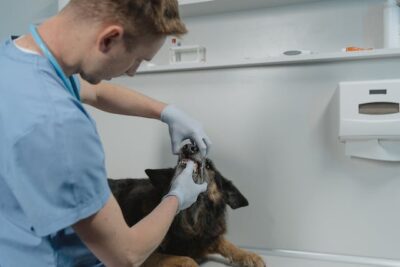
Dental Care for Puppies
Importance of Dental Health
Recognizing the crucial role of good dental hygiene in a puppy's life sets the foundation for their overall well-being as they grow into healthy adult dogs. Implementing regular dental care from an early age serves as a proactive measure to prevent potential dental issues down the road.
Brushing and Cleaning Techniques
Initiate tooth brushing early in your puppy's life to establish a positive and rewarding experience. This introduction not only helps your pup acclimate to the process but also sets the foundation for a healthy dental care routine that pays off in the long run.
Utilizing dog toothpaste and appropriate brushes enhances the effectiveness of this preventive measure, promoting robust dental habits.
Professional Dental Check-ups
Regular check-ups with a veterinarian are crucial for ensuring optimal dental health in your growing puppy. These professional examinations are instrumental in early detection of any dental issues, preventing the development of painful complications in the future.
Partnering with a veterinary dentist when needed ensures comprehensive care tailored to your puppy's unique needs, addressing concerns like periodontal disease, stinky breath, misaligned teeth, the emergence of new teeth, and the presence of 28 baby teeth. This collaborative approach to dental health is a proactive strategy benefiting pet owners and their dogs.

Nutritional Considerations: Supporting Your Puppy's Teething Journey
Teething Diet Recommendations
Adapting your pup's diet to align with their changing needs during teething is a thoughtful approach to ensure their comfort.
Introducing soft foods and selecting appropriate treats can significantly contribute to making the eating experience more enjoyable for your teething puppy.
These adjustments not only cater to their evolving preferences but also help address any potential discomfort associated with this developmental phase.
Foods to Avoid During Teething
Guiding your puppy through the teething journey requires careful consideration of the treats you provide. Avoiding hard treats is crucial to prevent discomfort or potential damage to emerging adult teeth.
Choosing softer alternatives not only promotes oral health but also enhances the overall teething experience, ensuring your puppy can comfortably eat moist foods and indulge in appropriate dog chews.
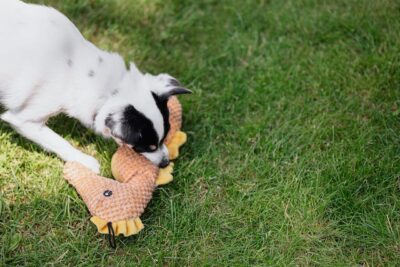
Teething in Different Breeds
Variations in Teething Timelines
While the general teething process remains similar, different breeds may experience teething at slightly different rates. It's crucial for pet parents to be attentive to their pup's specific developmental milestones, recognizing that variations exist among breeds.
Breed-Specific Considerations
Understanding that some breeds may have unique teething challenges is essential for effective care. Research your pup's breed to gain insights into potential variations in the teething process, allowing you to provide tailored care that meets their specific needs.
This knowledge is valuable for pet parents navigating the journey as their puppy's baby teeth fall out, and adult teeth emerge, ensuring a smoother and more informed teething experience for both you and your furry companion.
Environmental Factors
Impact of Surroundings on Teething
Recognizing the influence of surroundings on teething is crucial for pet parents. A calm and comfortable environment can significantly aid in easing the challenges of teething. It's essential to minimize stressors and create a soothing space for your pup, considering the impact of the environment on their overall well-being during this developmental phase.
Creating a Comfortable Teething Environment: Puppy Proof
Pet parents can play a proactive role in creating a comfortable teething environment for their furry companions. Offering cozy bedding, incorporating gentle lighting, and providing a quiet space all contribute to promoting relaxation during teething. By establishing a stress-free environment, you enhance your puppy's overall well-being and make the teething process more manageable.
Additionally, puppy proofing the surroundings ensures a safe and secure space for your teething pup to explore, fostering a positive and supportive environment during this transformative period.
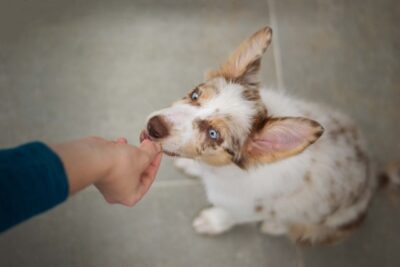
Teething and Training
Training Challenges During Teething
Teething introduces unique challenges to the training process as puppies may experience discomfort and heightened natural instincts to chew.
Understanding that this can make training a bit challenging, it's crucial for pet parents to remain patient and adaptable.
Recognizing the potential impact of teething on your puppy's behavior allows you to adjust your training routine accordingly, fostering a positive and supportive learning environment.
Positive Reinforcement Techniques
During the teething stage, positive reinforcement becomes especially valuable. Rewarding good behavior not only helps in reinforcing positive habits but also plays a key role in building a strong bond with your puppy. By acknowledging and encouraging desired behaviors, you navigate the challenges of teething while fostering a positive connection with your furry friend.
This approach proves particularly effective in addressing biting concerns and supporting essential aspects of training, such as potty training, during this natural and sometimes painful process.
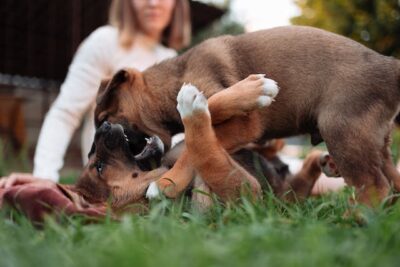
Socialization During Teething
Encouraging Interaction with Other Dogs
Teething is not a reason for isolation. Actively promote socialization with other dogs to ensure your pup grows into a well-rounded and friendly adult dog.
Exposing them to various canine interactions during the teething stage contributes to their social development and fosters positive relationships.
Building Confidence Through Human Interaction
Socializing your pup with humans is equally important during teething. Expose them to diverse human interactions to help build confidence and create positive associations. This exposure contributes to their overall emotional well-being and helps shape a friendly demeanor.

Teething and Sleep Patterns
Addressing Disruptions in Sleep
Teething discomfort can lead to disruptions in your pup's sleep patterns. Establishing a soothing bedtime routine becomes crucial to help your furry friend relax and navigate this period of discomfort.
Creating a Consistent and Calming Bedtime Routine
Incorporate calming activities before bedtime, such as gentle play or a relaxing massage, to ease your pup into sleep. Consistency in this routine is key to ensuring a good night's sleep, promoting overall well-being during the teething phase.
Monitoring Dental Health
Importance of Regular Check-ups
Incorporating routine dental check-ups into your pup's overall healthcare is crucial across their lifespan. These check-ups facilitate early detection of dental issues, allowing for prompt intervention and ensuring your furry companion's optimal oral health.
Proactive Measures for Early Detection
Taking a proactive approach to monitor dental health aids in the prevention of serious problems down the line. Keep a keen eye on any signs of discomfort, especially during key developmental stages like teething. Addressing concerns promptly contributes to a healthy and pain-free oral environment for your puppy.
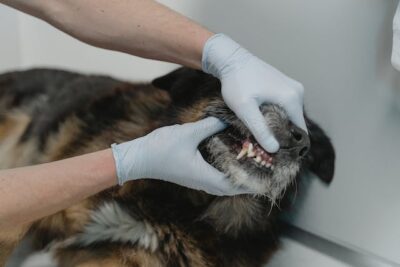
FAQs on Puppy Teething
- Q1: When do puppies start teething?
- A1: Puppies usually start teething at around three weeks of age. This marks the beginning of the transition from their baby teeth to adult teeth.
- Q2: What are baby teeth in puppies?
- A2: Baby teeth, also known as milk teeth, are the initial set of teeth that puppies develop. These deciduous teeth play a crucial role in the early stages of a puppy's life.
- Q3: How long does the teething stage last in most dogs?
- A3: The teething stage in most dogs typically lasts until they are around six months old. By this time, they should have a full set of adult teeth.
- Q4: What are the signs that my puppy is teething?
- A4: Signs of teething include excessive drooling, gnawing on objects, and a slight decrease in appetite. These behaviors often start around three weeks and indicate the onset of the teething process.
- Q5: Do puppies experience pain during teething?
- A5: Yes, puppies may experience discomfort and pain during teething. It's a natural and sometimes painful process as their baby teeth fall out, making way for adult teeth.
- Q6: How can I relieve my puppy's teething discomfort?
- A6: Provide appropriate chew toys, frozen treats, or soothing gels to help relieve your puppy's teething discomfort. Experiment with different options to find what works best for your furry companion.
- Q7: What are needle teeth in puppies?
- A7: Needle teeth refer to the sharp, pointed baby teeth that puppies develop during the early weeks of life. These needle-like teeth can contribute to discomfort during teething.
- Q8: When do puppies stop biting during the teething stage?
- A8: Puppies may exhibit biting behavior during the teething stage, which usually diminishes as they reach six months of age when their adult teeth are fully developed.
- Q9: How can I maintain my puppy's teeth healthy throughout the teething process?
- A9: Offer suitable chew toys, monitor their diet, and consider introducing dental care routines like brushing early on to ensure your puppy's teeth stay healthy during the teething process.
- Q10: What is the significance of the puppy stage in dental health?
- A10: The puppy stage is crucial for establishing healthy chewing habits and maintaining optimal dental health. It sets the foundation for a lifetime of good oral hygiene in your canine companion.

Summary
In summary, navigating your puppy's teething phase is a journey that requires attention and care.
Recognizing the early signs, providing suitable chew toys, and maintaining good dental care practices contribute to a smooth transition for your puppy into a happy and healthy adulthood.
Additional Insights
During the teething process, paying special attention to your puppy's teeth teething and ensuring their teeth stay healthy is crucial.
Offering appropriate chew toys not only alleviates discomfort but also promotes healthy dental habits, setting the stage for a lifetime of strong teeth.
Conclusion
Building a strong bond during your puppy's teething phase is a precious opportunity to connect and foster companionship. Embracing the challenges, celebrating the milestones, and cherishing these moments contribute to a harmonious relationship as your furry friend grows into their paws.
As your puppy's baby teeth start coming and adult teeth start emerging, your proactive approach lays the groundwork for a future of shared joy and well-being.




